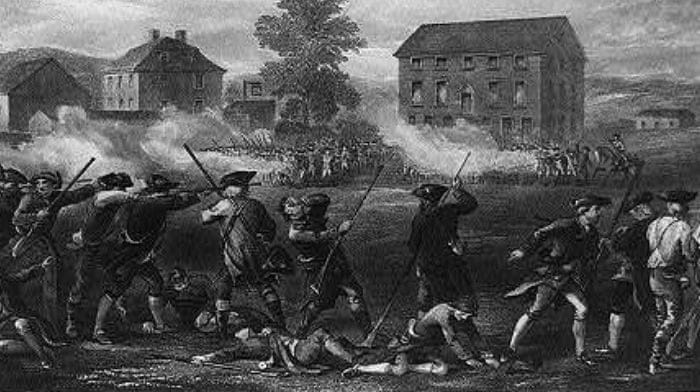
By Michael Warren for RealClearPublicAffairs
Today, we remember the start of the American Revolution – the “shot heard round the world” in the famous words of poet Ralph Waldo Emerson.
For well over a decade, the British Empire was engaged in a wide-ranging campaign to crush colonial liberties in America. Contrary to popular belief, it went much deeper than taxation without representation.
King George III and a compliant Parliament had declared supremacy in all matters, mandated that the colonials submit to the Empire’s diktats even though they had no representation in Parliament, and granted only the rights they thought appropriate.
The Empire carried out this plan in numerous ways, which explains why there are 27 grievances of British oppression in the Declaration of Independence.
RELATED: 76 Non-Military, Non-Law Enforcement Federal Agencies Stockpile Weaponry
Understandably, colonial resistance was widespread and stiff. The colonists repeatedly petitioned for relief, but they were repeatedly dismissively ignored.
The King decided a military solution was necessary to quash colonial resistance. Redcoats swiftly occupied Boston, the perceived epicenter of colonial unrest.
Troops were directed to go on the offensive and secretly arrest colonial political leaders and capture military supplies. England’s political and military leadership were certain that a quick blow would break the Americans and end any pretense of rebellion.
The British commander in Boston was determined to arrest Samuel Adams, a leading Son of Liberty and major agitator for American resistance, and John Hancock, a rich merchant and leading political leader.
In April 1776, both men were ensconced in the small village of Lexington, about 14 miles away from Boston. The British were also determined to target an arms cache in Concord, about 25 miles outside of the city.
The plan of action was simple: march at least 850 Redcoats to Lexington and arrest Adams and Hancock and then proceed another 13 miles to Concord, destroy or capture the military supplies they found there, and return to Boston.
The British maneuvers began late on the night of April 18th. Troops were brought by ships from Boston to a landing point where they would begin their march inland. The colonials quickly moved to alert the countryside of the coming attack.
RELATED: Putting Biden’s Gun Control Claims To The Truth Test
Son of Liberty Dr. Joseph Warren sent riders Paul Revere and William Dawes to warn Lexington and Concord, telling all they passed that the British were coming. At Revere’s instructions, two lanterns were hung on the steeple of the North Church, signaling that the British were coming by sea.
Revere and Dawes made it to Lexington by-way-of different routes and warned Hancock and Adams. On the way to Lexington, Revere was detained by British troops, and they threatened to kill him, but he was eventually abandoned.
Meanwhile, dawn had broken. In Lexington, no more than 70 determined but hopelessly outnumbered colonial militia faced down the British troops.
Who fired the first shot on the village green is lost to history, but it was a slaughter. Several colonists were killed on the spot; only one British soldier sustained a small injury. Somehow, Adams and Hancock eluded capture.
The British soon departed for Concord, where they burned a meeting house and some supplies. Hundreds of colonial militia confronted the British, and a skirmish broke out that led to several deaths on each side.
Sensing serious jeopardy, the British started their 25-mile march back to Boston. But the march was extremely perilous – the Americans made them pay. The British were almost continuously harassed by gunfire from colonials who hid in the woods, behind walls, and in homes.
RELATED: Bush Criticizes GOP, Trump – Wants 2024 Candidate Who Supports Gun Control And Amnesty
Desperate British troops stormed some of the homes and committed atrocities of the highest order. At the end of the day, nine Americans lay dead, 39 were wounded, and five went missing; the British suffered 73 deaths, 174 injured, and 26 missing. This disaster was far from the decisive victory the British arrogantly expected.
The Americans had proven their resolve to live free or die. As the heirs of this legacy, we should determine to keep the spirit of liberty alive in our hearts and minds.
Syndicated with permission from RealClearWire.
Michael Warren is an Oakland County Circuit Court Judge and co-founder of Patriot Week, author of America’s Survival Guide, and host of the Patriot Lessons: American History & Civics podcast.
